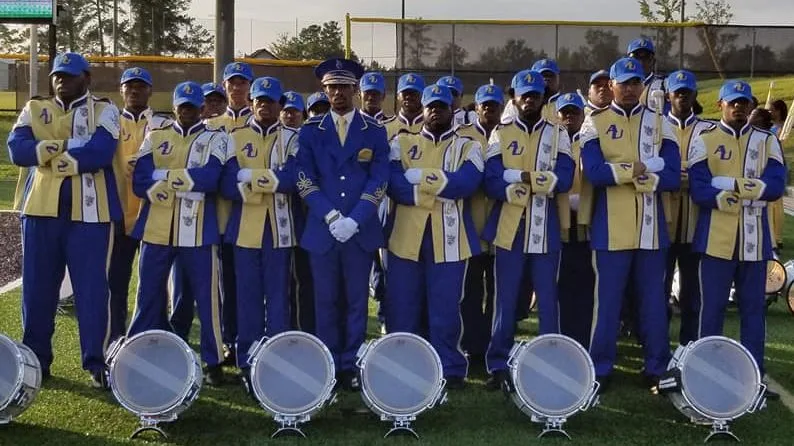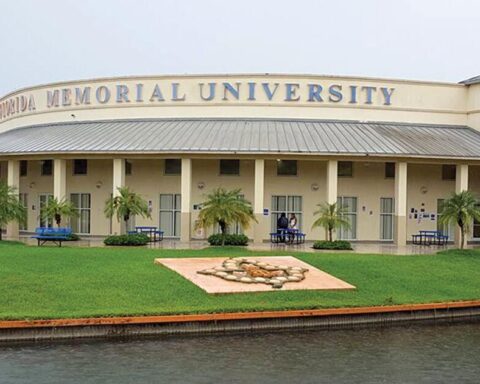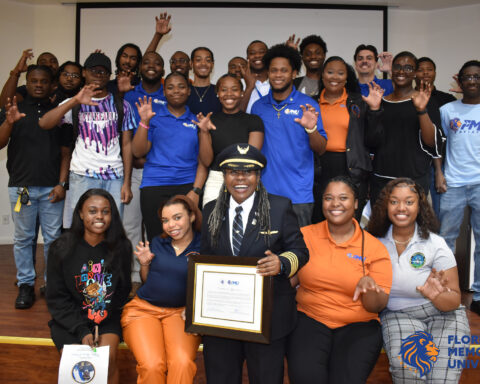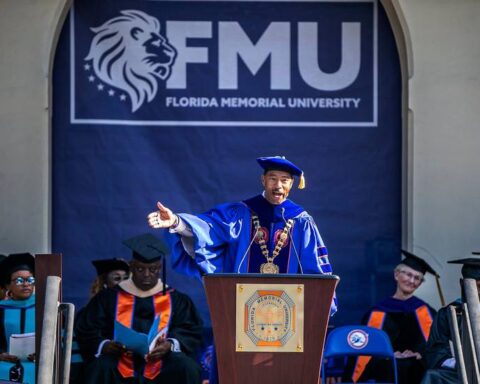By Mia Berry,
Marching bands are an integral part of the culture at historically Black colleges and universities (HBCUs). The entertainment value, brand recognition and traditions that come with HBCU bands inspired two universities to create and reestablish their programs.
Florida Memorial University’s ROAR Marching Band and Allen University’s Band of Gold have existed for less than five years, but both managed to jump into The Undefeated’s initial Division II top-10 rankings. New band rankings are out this week, and Florida Memorial remain in the poll. The road to national recognition for both band programs hasn’t been easy.
When Richard Beckford arrived at Florida Memorial in 2020, he inherited a blank canvas and would rely on nearly 30 years of band directing experience to paint a picture that would give Florida Memorial students the full HBCU experience, complete with the pageantry, innovation and tradition.
During the course of his career, Beckford built a strong reputation as a band builder through revitalizing high school band programs at Blanche Ely High School and his alma mater Miami Carol City Senior High School. He sent hundreds of kids to college to continue their band careers, many to his alma mater Florida A&M.
Aware that university is the lone HBCU in southern Florida, Beckford and Florida Memorial president Jaffus Hardrick knew a band program nestled right in Miami Gardens would change the scope of the South Florida community and compete with other HBCUs.
“Throughout my studies and career in higher education, I have had the privilege of hearing many HBCU bands around the country and wanted to create that same vibe here at FMU. Marching bands are part of the HBCU experience and culture and are a great way to empower students,” Hardrick told The Undefeated. “The ROAR marching band has quickly become a very valuable asset to FMU. Having a world-class marching band elevates the college experience and helps attract prospective students. There is also a community impact beyond the campus.”
Beckford didn’t inherit a program with a name like Triple Threat Marching, Marching 100 or Marching Wildcats. Instead, he had to come up with nomenclature that tied into the FMU culture. Beckford wanted the band to have the essence of the lion, the university’s mascot, so he choose The ROAR, a name that he believed would strike fear in other bands. The band field is known as the Serengeti, a tribute to the national park in Tanzania where more than 3,000 lions roam, and the dance team is known as the LionEssence.
Next, Beckford assembled a staff of instructors with knowledge and experience playing and teaching other HBCU bands. Although his program has a mixture of numerous HBCU influences, Beckford strives to maintain the program’s originality.
“I don’t want to be a follower. I want to be a trendsetter,” Beckford said. “We do a lot of research as to what’s going on all over places. It’s hard to do something absolutely original nowadays, because a lot of things have been done, but we tried to drive to create things that are as original as possible.”
Taking feedback from his own daughters and the thousands of students he’s taught over the course of his career, Beckford knew he wanted to support mental health and provide holistic growth beyond physical and musical development.
“My biggest thing is getting kids to understand what you’re teaching them. Students today are really, really good imitators, but they don’t always understand the nuances involved with the things that they are imitating. One of the main goals that we wanted to do was establish a stamp that allows for the students to delve deeper into their understanding,” Beckford said. “One of the things I wanted to do was make sure that we’re a program that challenges them physically and musically, but also embraces the understanding that they do have mental health issues that we have to be very careful to navigate around.”
Despite fall 2020 being the band’s first official year, the cancellation of football season delayed the first live halftime performance until August. Witnessing the band’s growth and first performance, Beckford likens the first moment seeing his band perform to witnessing a birth.
“It was everything. I told the kids and I told my wife it was like giving birth. Like you had all this stuff stored up in you, all these nutrients that you poured in all of the energy you invested. And then you finally saw our product,” Beckford said. “We still need to grow and develop, but actually seeing the physicality manifest was literally like giving birth. It was a very proud moment and I knew I had a couple of tears trying to keep it away from everybody else, but I definitely did. My heart was really filled with joy, just knowing that we were able to come to this point.”
Unlike Beckford, Allen University band director Eddie Ellis didn’t have to start from scratch. Ellis, who directed programs at Morris Brown College and South Carolina State, had to resurrect a band that hadn’t been active in 50 years.
When Allen University reinstated its football team in 2018, university president Ernest McNealey wanted to create a complementary band program.
“It would have been unthinkable to sponsor football without a marching band and all that would be related to it. The planning went forth jointly. Certainly, my experience as a student and professional made clear that if an excellent marching band program can be established, fans and alumni will still come out, notwithstanding the ebb and flow of the football team,” said McNealey.
“While a band is no small undertaking, if the aim is to build an excellent program, doing so enriches the overall experience of all associated with the institution. The delight and pride in seeing a well-dressed, well-equipped, well-playing marching band and the attention that it garners is difficult to quantify.”
It helped that Ellis had some recollection of the band from his marching band days at his alma mater Morris Brown, and he knew two people who had participated in both the football program and the marching band back in the 1960s. For Band of Gold, one of the initial challenges was finding the balance between merging old and new traditions.
“I asked them about some of the things that they did when they went to school, some of the traditions, and some of the stuff that I had done in terms of my experience to start this program and to initiate the tradition,” Ellis said. “A lot of times, the best traditions for me have come by accident. You may just play a little hot tune in the stands, you play for first down and then the fans in the stands automatically connect to what you’re playing. So now you [have] a tradition. Those are things that were intended to push and motivate, but when they stuck, it was not necessarily done to create a tradition.”
While rebuilding the band program, a major selling point for recruiting new students was ensuring their role in making history and being the foundation. Discounting the pandemic year, the band has been marching for three full seasons, and although Allen hadn’t had a band since 1968, fans and alumni were welcoming.
“When the students came to the game, it was like we’ve been around for many years. They were behind us. We had a good fan reaction. The reception was good not only from the students, but from the alumni and staff, especially our president,” Ellis said. “It was his vision. So he supports it, as long as we’re presenting a positive image for the university. We’re bringing in quality students, everybody at [the] university taking on the whole marching bandwagon, [and] we’re getting a lot of support.”
While Ellis was delighted to see Allen ranked No. 7 in the inaugural season rankings, he is eager to see the Band of Gold climb the next list.
“We weren’t doing it to be ranked. But now, since the rank is out there, we want to be No. 1. A lot of people don’t think about 2, 3, 4, 5, 6, 7, 8, 9, they want to know who is No. 1,” Ellis said. “If we [are going to] be ranked, then we want to be sure to be the best. If we don’t make it, then we try again.”
The ROAR expressed a similar sentiment. It’s focused on improvement and is out to prove it belongs in the conversation for best Division II HBCU bands.
“Recognition is confirmation. We just didn’t expect that so soon. It is confirmation that we are on a positive trajectory. We are going in the right direction, and keep doing what we are doing,” said Brian Snell, FMU assistant director of bands. “Our band is getting stronger and better week by week. We see it on a daily basis. We feel our most recent show was better than the very first show. It was confirmation, but it was also inspiration as well.
“We’ve all told the band members this is the time that you put the foot on the gas. This is when you shift up to the next gear. So now we got to bump the quality level of the show so we’re not a one-hit wonder. That wasn’t a fluke, that wasn’t a one-off. This is something that you’re going to see consistently.”







